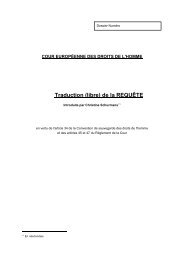VERZOEKSCHRIFT
VERZOEKSCHRIFT
VERZOEKSCHRIFT
You also want an ePaper? Increase the reach of your titles
YUMPU automatically turns print PDFs into web optimized ePapers that Google loves.
9191/1288432.1<br />
"62. En résumé, pour que l'Etat défendeur puisse devant la Cour invoquer le statut de<br />
fonctionnaire d'un requérant afin de le soustraire à la protection offerte par l'article 6, deux<br />
conditions doivent être remplies. En premier lieu, le droit interne de l'Etat concerné doit<br />
avoir expressément exclu l'accès à un tribunal s'agissant du poste ou de la catégorie de<br />
salariés en question. En second lieu, cette dérogation doit reposer sur des motifs objectifs<br />
liés à l'intérêt de l'Etat. Le simple fait que l'intéressé relève d'un secteur ou d'un service<br />
qui participe à l'exercice de la puissance publique n'est pas en soi déterminant. Pour que<br />
l'exclusion soit justifiée, il ne suffit pas que l'Etat démontre que le fonctionnaire en<br />
question participe à l'exercice de la puissance publique ou qu'il existe – pour reprendre<br />
les termes employés par la Cour dans l'arrêt Pellegrin – un « lien spécial de confiance et<br />
de loyauté » entre l'intéressé et l'Etat employeur. Il faut aussi que l'Etat montre que l'objet<br />
du litige est lié à l'exercice de l'autorité étatique ou remet en cause le lien spécial<br />
susmentionné. Ainsi, rien en principe ne justifie de soustraire aux garanties de l'article 6<br />
les conflits ordinaires du travail – tels ceux portant sur un salaire, une indemnité ou<br />
d'autres droits de ce type – à raison du caractère spécial de la relation entre le<br />
fonctionnaire concerné et l'Etat en question. En effet, il y aura présomption que l'article 6<br />
trouve à s'appliquer, et il appartiendra à l'Etat défendeur de démontrer, premièrement,<br />
que d'après le droit national un requérant fonctionnaire n'a pas le droit d'accéder à un<br />
tribunal, et, deuxièmement, que l'exclusion des droits garantis à l'article 6 est fondée<br />
s'agissant de ce fonctionnaire".<br />
(E.H.R.M. grote kamer, 19 april 2007, "Vilho Eskelinen e.a. t. Finland", verz. 63235/00)<br />
Zeer recent, op 5 februari 2009, werd in de zaak Olujić t. Kroatië, verz. 22330/05),<br />
geoordeeld dat Uw Hof inderdaad was teruggekomen op haar eerdere rechtspraak:<br />
"33. However, in its recent judgment in the Eskelinen case (see Vilho Eskelinen and<br />
Others v. Finland ([GC], no. 63235/00, 19 April 2007), the Court found that the functional<br />
criterion adopted in the Pellegrin judgment had not simplified the analysis of the<br />
applicability of Article 6 in proceedings to which a civil servant was a party or brought<br />
about a greater degree of certainty in this area, as had been intended (§ 55). For these<br />
reasons the Court decided to develop further the functional criterion set out in the<br />
Pellegrin judgment and adopted the following approach (see Vilho Eskelinen and Others v.<br />
Finland, cited above, §§ 61 and 62):<br />
“The Court recognises the State's interest in controlling access to a court when it comes<br />
to certain categories of staff. However, it is primarily for the Contracting States, in<br />
particular the competent national legislature, not the Court, to identify expressly those<br />
areas of public service involving the exercise of the discretionary powers intrinsic to State<br />
sovereignty where the interests of the individual must give way. The Court exerts its<br />
supervisory role subject to the principle of subsidiarity (see Z and Others v. the United<br />
Kingdom [GC], no. 29392/95, § 103, ECHR 2001-V). If a domestic system bars access to<br />
a court, the Court will verify that the dispute is indeed such as to justify the application of<br />
the exception to the guarantees of Article 6. If it does not, then there is no issue and<br />
Article 6 § 1 will apply.<br />
...<br />
139




